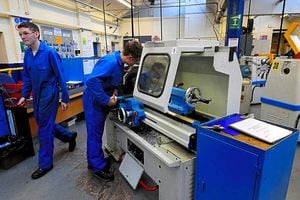Apprenticeships: Learn and earn proving popular in Shropshire
For years it was a way of life for millions of youngsters. Leave school on Friday, start work on Monday.

Often following in the footsteps of parents and grandparents before them, teenagers went straight from the school gates to their local factory, earning while learning their skills on the job.
They need a long-term commitment and, if you are not sure of your career path, then embarking on an apprenticeship is a road to nowhere for both you and your employer.
Levels of pay for teenage apprentices can be grim – far below the minimum wage. Nevertheless, modern apprenticeships are a success, with increasing numbers signing up for them.
All the traditional benefits are there in offering on-the-job learning of essential skills.
The employer gets to know the apprentice, and vice versa. Academic qualifications are going to have less weight with employers for some sorts of work than vocational qualifications which actually show that the young person is up to the job.
Going to university can land students with big debts for tuition fees, and no guarantee that they are going to get a well-paid job at the end of it. Apprenticeships have been devised to meet the needs of the modern working environment and are an important option for youngsters to consider.
It is all about optimising your chances of flourishing and prospering in the world of work.
Now, after apparently falling from favour as successive governments sought to encourage more young people into university, apprenticeships are back in a big way. The number of 16 and 17-year-olds signing up for apprenticeship schemes soared by 15 per cent last year, from 41,738 in 2013 to 49,228.
And Business Secretary Vince Cable has announced that two million apprenticeships have been created since the Coalition took office in 2010. He said the landmark is a testament to the Government's commitment to the training schemes.
The figures mark a huge turnaround compared to previous education policy. Former prime minister Tony Blair famously pledged to get 50 per cent of all young people into university by 2010.
Although he never managed to achieve that target — ironically, it was almost reached in 2011/2012 as students rushed to avoid new tuition fees introduced by the Coalition — it was a recurring theme throughout 13 years of Labour government that getting more youngsters into Higher Education was the key to greater social mobility.
However, the present Government's reform of apprenticeship schemes, with students working towards nationally recognised qualifications in partnership with local colleges, has led to vocational training being seen as a respected alternative to academic study.
It has allowed hundreds of employers including Microsoft, John Lewis, British Airways and BMW to develop the qualifications. Last year, the Shropshire Star's publisher Midland News Association also announced it would be jumping on board with a new scheme.
And a new generation of teenagers, faced with the alternative of paying up to £9,000 a year in tuition fees, are seeing the attraction of getting hands-on experience at a young age.

One such youngster is Oliver Seywell from Whitchurch, who three years ago decided to eschew A-levels in favour of an apprenticeship in computer engineering.
"I did try staying on at school for a while, but it wasn't for me," he says.
After a brief spell of work experience, he took up an apprenticeship scheme with Whitchurch-based Grocontinental, while receiving training from Telford College of Art and Technology.
Now working as a systems engineer for Wrexham-based MWL Systems, Oliver is now studying on a day-release programme for a Higher National Certificate in Computing and Systems Development at the college. He hopes to then continue his studies to degree level.
"It will take me two to three years to get the degree studying part-time, so it will not take me too much longer to get there," he says.
There are downsides, such as travelling between his home in Whitchurch, his employer in Wrexham, and the college in Telford. It also means giving up two nights a week for his studies.
"I would prefer to have the nights free, but sometimes you have to give things up for long-term benefit."
He says his course at Telford College opened his eyes to how broad the subject of IT was, and the future opportunities in the industry.
"I found the learning environment at Telford College very supportive and motivating," he says.
"My tutor, Simon Brown always went out of his way to support me

"Without the apprenticeship I would have struggled to get the experience and qualifications I have achieved."
Andy Rogers, aged 22, landed an apprenticeship in office administration with Telford-based Bespoke Computing in April 2013, and has never looked back.
"I went to sixth-form, and started doing AS-levels, but I dropped out, it wasn't really for me," he says
"I went to work in hotels, and I progressed to hotel management, but the money wasn't really enough. When I saw the apprenticeship scheme, I thought it would give me a foot in the door for a line of work I am really interested in."
And he said once he started, he found it much better than his expectations.
"I went into it a bit with my eyes closed, I expected it to be like a 'schooly' atmosphere, but it was much better, there is a real job to be done.
"I think, for me, going to work at a young age made me mature quite quickly."
The scheme also worked out well for Andy's employer Chris Pallett, who took on a second apprentice following Andy's success.
Meanwhile, Paul O'Neill, assistant principal at Telford College, says there has been a huge growth in the number of apprenticeships over the past few years, partly down to a shift in Government policy, partly down to a change in attitude from young people, and also down to an increase in demand from employers.
"In 2008/2009, we had an intake of 259, whereas the year before last it was 3,324, so it has grown massively," he says.
And Mr O'Neill says there are many advantages of learning a skill on the job, not least the financial benefits.
"I have got two daughters, one who is 27, the other who is 24," he says.
"The older one went to university and has got £15,000 or £18,000 worth of debt, and got a job at the end, the other one went on an apprenticeship and also got a job. Is there a major difference? I think the £15,000 debt is the main difference."





